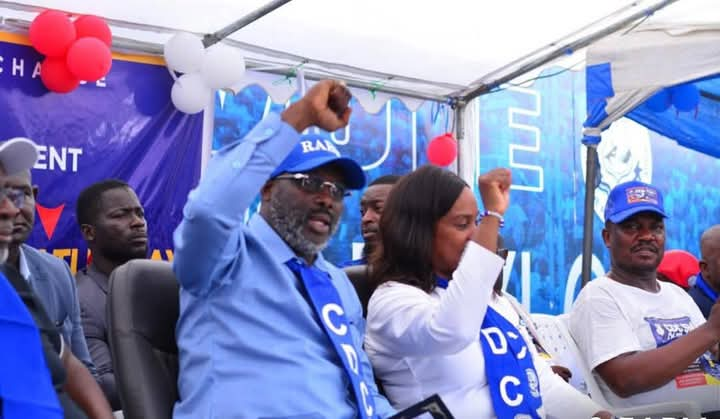In April 2025, former Liberian President George M. Weah launched a “dollar rally” at the headquarters of his Coalition for Democratic Change (CDC) party, marking a significant step towards his anticipated political comeback in the 2029 presidential election. During the rally, Weah delivered a scathing critique of the incumbent Unity Party (UP) government led by President Joseph N. Boakai, accusing them of exacerbating poverty, fear, and hopelessness within the nation. He contrasted this alleged decline with his own time in office, highlighting his decision to concede the previous election as an act of strength and commitment to peace and democracy. Weah lamented what he perceived as a broken trust, asserting that the UP had ascended to power on a foundation of false promises and deceptive slogans, only to betray the public’s expectations. He criticized the government for what he described as an erosion of democratic principles, including executive overreach, disregard for the constitution, and a complacent response to legislative lawlessness.
Weah’s address served as a rallying cry for his supporters and a declaration of intent for the 2029 election. He emphasized the CDC’s readiness not only to win but also to govern effectively, correcting the perceived missteps of the current administration and restoring the dignity of the Liberian people. He called for unity and urged the youth, women, and elders of the nation to join their movement. The dollar rally, symbolically representing both financial support and a renewed commitment to the CDC’s cause, aimed to revitalize the party’s base and set the stage for a vigorous campaign in the upcoming election. Weah’s speech underscored his belief that the UP’s tenure had exposed the party’s inadequacies, contrasting sharply with the promises made during their campaign. He positioned the CDC as the solution to the problems currently plaguing Liberia, emphasizing the party’s dedication to stability, progress, and democratic values.
Central to Weah’s argument was the accusation that the UP government had failed to deliver on its promises of rescuing the nation. Instead, he claimed, the UP had deepened the nation’s economic woes and undermined democratic institutions. He pointed to alleged incidents of state-sponsored brutality against peaceful citizens and questioned the effectiveness of government spending on security operations, arguing that these initiatives failed to provide genuine protection for ordinary Liberians. Weah contrasted this alleged mismanagement with the CDC’s past performance, implying that his administration had provided greater security and economic stability. He appealed to the public to recognize the contrast between the UP’s rhetoric and their actions, emphasizing the need for a change in leadership.
Weah also stressed the importance of readiness and preparation for governance. He acknowledged the narrow margin of his electoral defeat, implying that reclaiming the presidency would require not only winning the election but also demonstrating the capacity to govern effectively. He emphasized the need to learn from past experiences and to develop comprehensive plans to address the nation’s challenges. This, he suggested, would distinguish the CDC from the UP, which he portrayed as having been unprepared for the complexities of governance. By emphasizing the importance of preparation, Weah aimed to project an image of competence and responsibility, contrasting with his portrayal of the UP as incompetent and negligent.
The former president’s message also specifically targeted different segments of the Liberian population. He called upon the youth to remain focused, clean, and strong, recognizing their potential role in shaping the future of the nation. He acknowledged the crucial role of women, referring to them as the backbone of the movement, and encouraged their continued engagement. Furthermore, he emphasized the wisdom and experience of the elders, urging them to continue supporting the CDC. By addressing these specific groups, Weah sought to broaden the appeal of his message and build a wider base of support. This targeted approach underscored his intention to create a truly national movement encompassing all segments of society.
The dollar rally, beyond its immediate financial implications, served as a symbolic gesture of revitalization and a reaffirmation of the CDC’s commitment to challenging the incumbent UP in the upcoming 2029 election. It provided Weah with a platform to articulate his criticisms of the current government, present his vision for the future, and energize his supporters. The rally aimed to generate momentum and create a sense of anticipation for the upcoming political contest. Weah, by launching his campaign well in advance of the election, signaled his determination to reclaim the presidency and positioned himself as a vigilant observer of the UP’s performance, ready to offer an alternative path for Liberia. The gathering served as a declarative moment, marking the beginning of a protracted political battle that will culminate in the 2029 presidential election.


